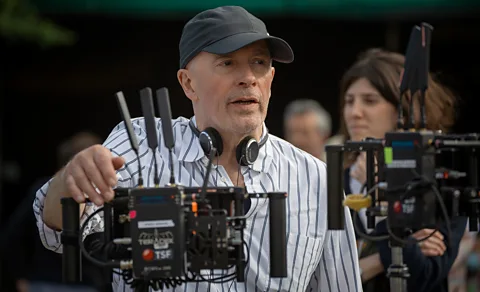'You're playing with one of our biggest wars': Why some Mexican people are upset about Oscars frontrunner Emilia Pérez
 Netflix
NetflixFrench director Jacques Audiard's musical about a Mexican drug lord is the frontrunner for this year's Academy Awards, with 13 nominations. But its depiction of the country is stoking criticism.
Rarely is a film so successful with critics and awards voters, yet so controversial to its detractors. Emilia Pérez, written and directed by French auteur Jacques Audiard, won both the Cannes Film Festival jury prize and a joint best actress prize for its four leads back in May. More recently, the Spanish language musical, set in Mexico but mostly filmed in France, has won four Golden Globes, five European Film Awards and been nominated for eleven Baftas. It's now the frontrunner at this year's Oscars, having received 13 nominations in today's announcement, more than any other film.
 Netflix
NetflixThe genre-mixing story of a male Mexican drug lord who transitions into a woman seeking restorative justice for the country's "disappeared" – dead and missing persons who have been the victim of drug and crime-related violence – has also made history with a nod for actor lead actress Karla Sofía Gascón. She is the first trans woman to be nominated for best actress. But while the film's characterisation of its transgender protagonist has been divisive – the US LGBTQ+ organisation Glaad has called it "retrograde" – it isn't even currently the most controversial talking point.
That would be Emilia Pérez's representation of Mexico, which has come under increasing scrutiny as awards season has kicked into gear. The film is due to open in Mexico to the general public tomorrow, but there have already been complaints from Mexican critics and industry figures about the negligible involvement of Mexican people among its leading cast and crew; and its depiction of the country, not least when it comes to dealing with such a horrifying subject.
Following Emilia Pérez's Golden Globes success, there was a flurry of criticism of the film on X from Mexican users. In one post that's been viewed 2.6 million times, Mexican screenwriter Héctor Guillén tagged the Academy of Motion Picture Arts and Sciences, who run the Oscars, the day after the Globes and published a poster saying: "Mexico hates Emilia Pérez/ "Racist Euro Centrist Mockery"/ Almost 500K dead and France decides to do a musical."
"I tried to copy the Hollywood way of promoting films [for awards consideration], you know, when they basically say, 'amazing film'" Guillén tells the BBC. "I wanted to do a counterpart of that, I wanted to get another vision out of what Emilia Pérez is to many of us Mexicans."
Awards Watch
Emilia Pérez has been nominated for 13 Academy Awards, making it the most recognised film at the 2025 ceremony. Karla Sofía Gascón and Zoe Saldaña earned acting nominations and the film is also up for Best Picture, Best Adapted Screenplay, Best Original Score and has two entries in Best Song: El Mal and Mi Camino. Saldaña won the Golden Globe award for Best Performance by a Female Actor in a Supporting Role in any Motion Picture and El Mal won for Best Original Song. Emilia Pérez is also nominated for 11 awards at the Baftas. Click here for more on the films getting awards buzz.
Guillén calls Audiard "a great film-maker" but says the decision to make the vast majority of the movie in studios outside Paris, as well as the way the story treats a painful national topic has upset many in his social network.
"There's a drug war, nearly 500,000 deaths [since 2006] and 100,000 missing in the country," he says, citing recent Mexican government figures."We are still immersed in the violence in some areas. You are taking one of the most difficult topics in the country, but it's not only any film, it's an opera. It's a musical. So for us and many activists, it's like you are playing with one of the biggest wars in the country since the Revolution [in the early 20th Century]. Part of the plot is about searching mothers of the disappeared [searching for their children]: one of the most vulnerable groups in Mexico. And there were zero words in the four Golden Globe acceptance speeches to the victims."
Guillén also questions why a decision wasn't made to involve more Mexican people in the production. One of the four leading actresses, Adriana Paz, is Mexican. Of the others, Zoe Saldaña, who won a best supporting actress Golden Globe, has Dominican heritage but was born in the US; Karla Sofía Gascón is Spanish, from a Madrid suburb, though she has worked extensively in Mexican TV; and the last (and most famous), Selena Gomez, is American, but with Mexican heritage. Having grown up speaking Spanish but lost her fluency, Gomez had to re-learn the language for the role, while her character Jessi was rewritten to make her character Mexican-American rather than purely Mexican. Meanwhile Saldaña's character, Rita, a lawyer, was changed to reflect Saldaña's Dominican, rather than Mexican, background. As for Audiard, he is not a Spanish speaker at all.
 Getty Images
Getty Images"Their way of making the film is to disregard so many in the (film) industry in Mexico already talking about this topic, like not considering Mexican screenwriters, or more Mexican actors other than Adriana, who did an amazing job," Guillén argues. He cites as "really painful" the film's Mexico-born casting director Carla Hool's comment during a Sag-Aftra Foundation Q and A that they had searched Latin America and Mexico for actors, but ultimately, they believed that they had chosen the best ones for the job. "Having a few Mexicans in there does not stop it from being a Eurocentric production," he adds.
There could be commercial reasons behind the casting decisions: Gomez and Saldaña are arguably bigger global names for the project than many Mexican actors. In particular, Gomez's performance led to another viral moment of criticism against the film, this time on a popular Mexican film podcast, Hablando de Cine.
Actor Eugenio Derbez told host Gaby Meza that Gomez's Spanish pronunciation was "indefensible" leading to Selena Gomez to comment on a TikTok post of the podcast clip: "I'm sorry, I did the best I could with the time I was given". Derbez later apologised for the remark, while Meza says that the wider interview between her and Debrez was not a criticism of Gomez's acting in the film – indeed, Gomez was nominated for a Golden Globe and a Bafta – or her Spanish accent, given she was supposed to be playing an American for whom Spanish is not her first language.
"It was intended to remark that if you don't speak Spanish, you just see her good performance with subtitles," Meza explains. "And she does give a good performance. What isn't good is that there's a disconnect between the words she says and her understanding of them. Her body, her voice, her tones say something, but the dialogue doesn't match with what she's saying. And that's not Selena's fault, because I think she wasn't given the proper indications, the tools for her performance. The director is French and Selena is from the United States, but they're communicating in Spanish."
 Netflix
NetflixMeza adds that in her opinion, the movie is one that's "designed for export". "If you go to resorts in Mexico, tourists can buy things that look Mexican, but they're made elsewhere," she says. "With this movie, you might see references to Mexican culture, and it might speak about Mexico, but it wasn't made in Mexico."
The film-maker's defence
However, amid the flurry of criticism, some accusations about the film are inaccurate. For example, one post on X called the director "a Frenchman who'd never set foot in Mexico". Audiard, however, tells the BBC that he went to Mexico several times, looking to shoot the film there, as well as cast the main roles.
"I had the idea of making an opera of Emilia Pérez and then I got a bit scared, I felt like I needed to inject some realism into it," he says. "So I went to Mexico, and we scouted there during the casting process as well, maybe two, three times and something wasn't working. And I realised that the images I had in my mind of what [the film] would look like just didn't match the reality of the streets of Mexico. It was just too pedestrian, too real. I had a much more stylised vision in my mind. So that's when we brought it to Paris and reinjected the DNA of an opera within it."
"And also," he adds, "it might be a little bit pretentious of me, but did Shakespeare need to go all the way to Verona to write a story about that place?"
Judging by the film's success in awards season, many critics and voters must agree with Audiard, or at least, believe Emilia Pérez has strong artistic merit regardless of this issue.
"I felt it was hugely fresh as a piece of work when I saw it," James Mottram, a British film critic, says. "I mean, a brand-new take on the cartel story, a very unusual musical, a transgender story. Just combining those three elements is a feat of narrative dexterity. I admire the bravery of the film more than anything. Audiard has worked in the crime genre before – if you could call this a crime film – with movies like The Beat That My Heart Skipped, but this felt brand new. And as a critic, that's what you're always looking for – someone who's taking on divisive subjects and putting a fresh spin on them.
"You can call Emilia Pérez a soap opera as well as an opera, and it is a fantasy on some level, I don't think it is supposed to be an authentic portrayal of the cartels. However, it's difficult, I can understand why some Mexicans are offended when it's such a sensitive subject for them, and not that many were involved in the production.
"There's been complaints from the trans community about it as well. Audiard's been attacked from all angles really, and perhaps understandably, but I think when you do something risky and divisive, that's always going to happen."
Jacques Audiard says that he first had the idea for the film after reading some of French author Boris Razon's novel Écoute, which featured in one chapter the minor character of a drug lord "who wanted to transition" but "Boris hadn't followed up on the idea", as Audiard puts it.
 Netflix
Netflix"There are two sensitive issues really in this film, transgender identity and the disappeared in Mexico," he says. "And it's something that I can't quite rationally explain, but there was a link between the two where I imagined that this story of whether this gangster, who's responsible for this evil, redeems themselves and by extension the whole of Mexico, through this transition, through changing themselves.
"And I think that the use of opera, of singing, and of dancing, allows a certain distance and by which it makes the message much more effective. It penetrates much more deeply than if than you were to document it in a very realistic manner."
Nevertheless, in a recent press conference in Mexico, Audiard apologised to his critics, saying that the film is opera, and thus not "realistic" and that "if there are things that seem shocking in Emilia Pérez then I am really sorry… Cinema doesn't provide answers, it only asks questions. But maybe the questions in Emilia Pérez are incorrect".
Yet, while there is some anger, the film also has high profile supporters in Mexico, including The Shape of Water director Guillermo Del Toro, who called Audiard "one of the most amazing film-makers alive" in an on-stage conversation with the director at a Directors Guild of America screening last October, and True Detective: Night Country director and writer Issa Lopez, who has declared the film a "masterpiece". Meanwhile Paz has said of the controversy: "I've heard people saying it's offensive to Mexico. I really want to know why, because I didn't feel that way. And I have questioned some people that I trust, not just as artists but as people, and they don't feel that way, so I am trying to understand."
Saldaña tells the BBC that letting film-makers carry out their artistic vision is important, even when the topic is delicate.
"I think that we're living through really sensitive times where communities are very vocal about being represented accurately," she says. "And I vacillate with respecting that, which is primarily my goal, but also allowing space for gentle film-makers or storytellers to have a very special approach to it and giving space for them to do it even if they're not a part of that community. Because sometimes they may have the best story to tell. And I think that Jacques was always respectful, was always very gentle, with how he was approaching it."
Saldaña, who was grateful that the film gave her an opportunity to work in her native Spanish language ("I've never been able to do it before, apart from an independent film in the Dominican Republic when I was very young, but never in the US,") also says that she "wasn't worried" about Audiard not speaking Spanish, as he had made films including A Prophet and 2015's Palme d'Or winner Dheepan in other languages besides French.
"He's challenged himself and defied this gravity that we hold ourselves to through language, and it hasn't prohibited himself from connecting with other people. I've always admired him for being curious about other cultures and for telling stories without appropriating himself," she says.
 Netflix
NetflixBut Emilia Pérez is now part of the current cultural debate about whether cultural authenticity is of paramount importance in storytelling, or if western productions should be more aware that they're open to accusations of cultural appropriation when directors are dealing with stories in countries and cultures outside their realm of experience.
Asked how he feels should the film be further rewarded by the Oscars, Héctor Guillén replies that, "it just shows the industry works that way, that it's distant from what's happening in Latin America and Mexico, even if we're not that far away from California.
The screenwriter says he "just wishes" the production had been "more open" to advice from within Mexico.
"I think Audiard is a great film-maker, and I think he was well intentioned with the film, I do not think he's a racist French man who wants to ridicule our culture," he says. "But he could have been more open to Mexican creators, to activists, to talk about the correct way to tell the story. Because I did think at the end of the film, there was an opportunity to be a great, great, audacious film in the right way."
Emilia Pérez is available to stream on Netflix internationally
--
If you liked this story, sign up for The Essential List newsletter – a handpicked selection of features, videos and can't-miss news, delivered to your inbox twice a week.
